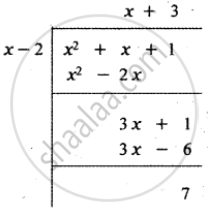Advertisements
Advertisements
प्रश्न
Integrate the following functions with respect to x :
`x^3/((x - 1)(x - 2))`
उत्तर
`int x^3/((x - 1)(x - 2)) "d"x = int ((x^3 - 1) + 1)/((x - 1)(x - 2)) "d"x`
= `int ((x^3 - 1)/((x - 1)(x - 2)) + 1/((x - 1)(x - 2))) "d"x`
= `int (x^3 - 1)/((x - 1)(x - 2)) "d"x + int ("d"x)/((x - 1)(x - 2))`
= `int ((x - 1)(x^2 + x + 1))/((x - 1)(x - 2)) "d"x + int ("d"x)/((x - 1)(x - 2))`
= `int ((x^2 + x + 1))/(x - 2) "d"x + int ("d"x)/((x - 1)(x - 2))` ........(1)
Consider `int (x^2 + x + 1)/(x - 2) "d"x`.
As the degree of the N.R is greater than the degree of the D.R divide the N.R by D.R till the degree of the N.R less than the degree of the D.R.

`(x^2 + x + 1)/(x - 2) = x + 3 + 7/(x - 2)`
`int (x^2 + x + 1)/(x - 2) * "d"x = int [(x + 3) + 7/(x - 2)] "d"x`
= `int (x + 3) "d"x + int 7/(x - 2) "d"x`
= `int x "d"x + 3 int "d"x + 7 int ("d"x)/(x - 2)`
`int (x^2 + x + 1)/(x - 2) * "d"x = x^2/2 + 3x + 7 log |x - 2|` ........(2)
Consider `int ("d"x)/((x - 1)(x - 2))`
`1/((x - 1)(x - 2)) = "A"/(x - 1) + "B"/(x + 2)`
1 = A(x – 2) + B(x – 1)
Put x =
1 = A(2 – 2) + B(2 – 1)
1 = A × 0 + B × 1
B = 1
Put x = 1
1 = A(1 – 2) + B(1 – 1)
1 = A × – 1 + B × 0
A = – 1
`1/((x - 1)(x - 2)) = - 1/(x - 1) + 1/(x - 2)`
`int ("d"x)/((x - 1)(x - 2)) = int (- 1/(x - 1) + 1/(x - 2)) "d"x`
= `int - ("d"x)/(x - 1) + int ("d"x)/(x - 2)`
= `- log |x - 1| + log |x - 2| + "c"` ........(3)
Using equations (2) and (3), equation (1) becomes
`int x^3/((x - 1)(x - 2)) "d"x = x^2/2 + 3x + 7 log |x - 2| - log |x - 1| + log |x - 2| + "c"`
= `x^2/2 + 3x + 8 log |x - 2| - log |x - 1 + "c"`
APPEARS IN
संबंधित प्रश्न
Evaluate : `∫_0^(pi/2) (sinx.cosx)/(1 + sin^4x)`.dx
Evaluate : `int_0^1 "x" . "tan"^-1 "x" "dx"`
Find the volume of the solid generated by the complete revolution of the ellipse `"x"^2/36 + "y"^2/25 = 1` about Y-axis.
Integrate the following functions with respect to x :
`(cos2x - cos 2 alpha)/(cosx - cos alpha)`
Integrate the following functions with respect to x :
`(cos 2x)/(sin^2x cos^2x)`
Integrate the following with respect to x :
`(sin^-1 x)/sqrt(1 - x^2)`
Integrate the following with respect to x :
`1/(x log x log (log x))`
Integrate the following with respect to x :
`tan x sqrt(sec x)`
Integrate the following with respect to x:
x3 sin x
Integrate the following with respect to x:
x5ex2
Integrate the following with respect to x:
`"e"^(- 3x) cos x`
Integrate the following with respect to x:\
`logx/(1 + log)^2`
Find the integrals of the following:
`1/(6x - 7 - x^2)`
Integrate the following with respect to x:
`(5x - 2)/(2 + 2x + x^2)`
Choose the correct alternative:
The gradient (slope) of a curve at any point (x, y) is `(x^2 - 4)/x^2`. If the curve passes through the point (2, 7), then the equation of the curve is
Choose the correct alternative:
`int sin^2x "d"x` is
Choose the correct alternative:
`int (x^2 + cos^2x)/(x^2 + 1) "cosec"^2 x/("d"x)` is
Choose the correct alternative:
`int x^2 cos x "d"x` is
Choose the correct alternative:
`int ("d"x)/("e"^x - 1)` is
